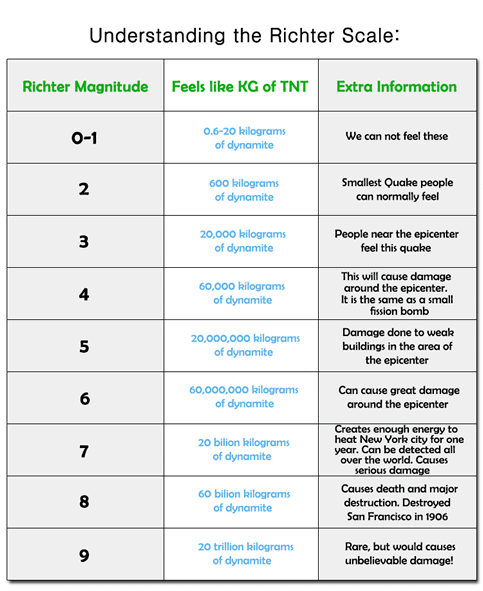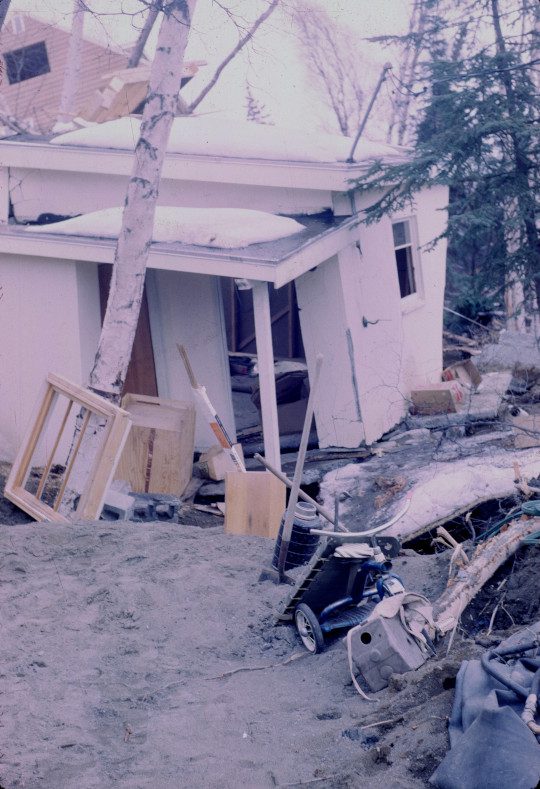Earthquake preparedness is not just important for people that live on the West Coast, but for people located in all regions.
You might be surprised to hear that of all places, Oklahoma came in 2nd in the number of earthquake occurrences between 2010 and 2015. California wasn’t even first in this category, Alaska was. Alaska had 9,020 according to the U.S. Geological Survey.
Unlike hurricanes and tornados, there’s no such thing as an “Earthquake Season”. They can happen any day of the year.
Similar to our recent article that covered preparedness before, during, and after a hurricane, this week we decided to offer some helpful guidelines for being prepared for earthquakes.
Follow along as we discuss disaster preparedness before, during, and after an earthquake.
What are Earthquakes?
Briefly, it’s important to know that an earthquake is a ball of energy that can take the form of shaking or vibrations. In most cases, it is caused by the movement of Earth’s outermost layer, the tectonic plate, against other plates.
When two or more tectonic plates move differently from one another, this is called an earthquake.
The most common standard used to measure the magnitude of an earthquake is using the Richter Scale. This measures the amount of energy released during an earthquake.
The chart below from SMS Tsunami Warning.com shows the various levels of magnitude and compares each level to what it feels like compared to the blast of dynamite.

As you can see above, each level increases on a logarithmic scale.
Preparing Before an Earthquake
There’s no way to know when an earthquake will happen, so before the rumbling starts, it’s important to start preparing now.
Check for risks inside your home, because chances are a lot of things are going to fall.
Shelves and Walls
Make sure your shelves and anything hanging on your walls are attached securely.
If you have heavy items hanging up in a bedroom, make sure they’re not located near the bed. It would be terrible to have something fall on you or a loved one if an earthquake occurs in the middle of the night or early morning.
Make note of areas where people frequently sit inside your home. Kitchen tables, sofas, and recliners are high-risk areas.
If you have heavy objects on your shelves, put those on lower shelves if possible.
Do you have expensive china? If you’re in a high-risk area for earthquakes, make sure to keep those items in cabinets with latches, and as low as possible.
People like to show off their guns or their swords on a mantle. Do whatever you can to make these quake-proof.
Ceilings
It’s nice if you can afford to hang chandeliers in your home or fancy lighting hanging from the ceiling. Double-check to ensure those are hung securely.
If you have any deep cracks in your ceilings, it’s important to get those fixed. Seek advice from an expert if you’re not sure what to do.
Miscellaneous
Some people have their water heaters in a closet-type area or in their garage. Find a way to bolt these to the floor or have them strapped to a nearby wall stud.
Make it a point to inspect your electrical wiring and gas connections. Resolve any issues you find as soon as possible. Not only are those types of things fire hazards on any given day, but the intense shaking during an earthquake can make these worse.
It’s common for people to hang heavy or sharp tools up in their garage. Think twice about how high you hang these items.
Again, if you’re not sure how to fix these types of things, seek the advice of an expert or do some research online. Bob Villa has some quality and simple how-tos to help others fix things around their homes.
Safety
Identify a spot in each room of your house to hide under for protection when an earthquake strikes. Most people assume that standing in the doorway of a room is the safest place, but a sturdy desk or table can provide much more safety.
Take note of places outside of your home that can provide safety if you are outside during an earthquake. Some spot out in the open and clear of any area where powerlines or telephone polls might fall is safest. Also, pay attention to any weak-looking large trees on your property, and make sure to stay clear of those.
Family Safety Preparedness
Your children should know how to call 9-1-1 in case you get injured and can’t do it yourself.
The entire family should be prepared and know how to turn off all electricity, gas, and water lines. There are a lot of adults that don’t know how to locate, let alone, turn these off.
Designate an outside family member, close friend out of state, or outside of the immediate area to be the family’s emergency contact liaison. Long-distance calls are sometimes more successful post-earthquake since local lines are likely to be tied up for emergency response reasons.
Your family should keep the following items stocked and easy to access in your home:
- Food and Water
- Batteries
- Emergency Radio
- Flashlights
- First Ait Kit and Supplies
- Manual Can Opener
- Your Disaster Preparedness Binder
During:
If you’re indoors and an earthquake happens, stay inside, get low, and retreat to the pre-designated safety spot in each room of your home. Again, a stable desk or table is reliable. If none are available, stay close to an inner wall in a hallway.

Being near windows is a hazard because they can break and pieces of glass might start dropping.
Contrary to popular belief, a doorway isn’t necessarily the safest spot. Doors can slam and cause injuries.
Are you in an elevator? Press the button for every floor until it stops. Then get out of there as soon as possible.
If outdoors, head to your pre-defined safety area that’s clear of anything that may fall on you.
Pay attention if you’re hiking or in a mountainous area. Fallings rocks are common during earthquakes.
Do things start shaking while you’re out driving? Pull over to a safe area that’s away from traffic. Don’t park under a bridge or overpass, and make sure to stay in your vehicle until things stop shaking.
Whatever you do, don’t panic. Earthquakes don’t last forever, but they can be scary and it can seem like a lifetime until they’re over. Just control your breathing and stay calm.
What to Do After an Earthquake
Earthquake preparedness is important for after as well. The immediate moments following an earthquake can be scary, too. To start, you have no idea how much damage it did outside of your immediate viewing area. Some homes get affected more than others for age and structural reasons. While your home only experienced minor damage, your neighbor’s vintage home could have been completely destroyed.

One thing that surprises a lot of people is the aftershocks. Aftershocks are more earthquakes that happen after the first one, but they lessen in severity and they don’t last as long as the original.
This is why it’s vital to remain in a safe place until the aftershocks stop or get to a point where they’re barely noticeable. This is especially true if the first earthquake was a large one. You have time to make sure everyone in your home is safe but then return to your safe area.
Safety Tips
If you’re in a structure that has experienced a lot of damage, get out as soon as possible. Additional quakes will only make the damage worse. This is your time to get out.
Ensure to rally your pets together in a secure location. When earthquakes strike, they tend to scare pets and the pets take off, sometimes never to return again.
Once you feel like everything is safe, find and turn on your emergency radio. This is a reliable resource for information. The radio can advise you of whether or not it’s safe to travel, what areas were most affected, and areas to avoid due to gas leaks or fires, and more.
Don’t go traveling immediately after an earthquake. For several reasons, but most important some roadways or bridges might be damaged, and the roads need to be cleared for emergency services that are trying to get to people that need help.
If you’re driving and you decide to keep driving after the rumbling stops, be on the lookout for any breaks in the road and for things that may have fallen.

If you’re outside when an earthquake happens, be careful before going back into your home, especially if you see structural damage.
Look around your neighborhood and check on your neighbors. Someone could be hurt or stuck and as good preppers and human beings, we need to watch out for other people. Imagine if something fell on you and you were stuck for hours because no one thought to check on you.
If you’re at the beach, get inland as soon as you can. Tsunamis are dangerous and they can occur quickly.
Earthquake Preparedness Closing Thoughts
You can’t run and hide from an earthquake, but being prepared and having a plan will lessen the severity of the aftermath.
This discussion only grazed the surface of ways you can implement earthquake preparedness. The internet is covered in resources to help you and your family prepare to be safe before, during, and after!
Let us know in the comments below if you have more insight on earthquake preparedness. How do you prepare for events like this?
Stay prepared friends!
